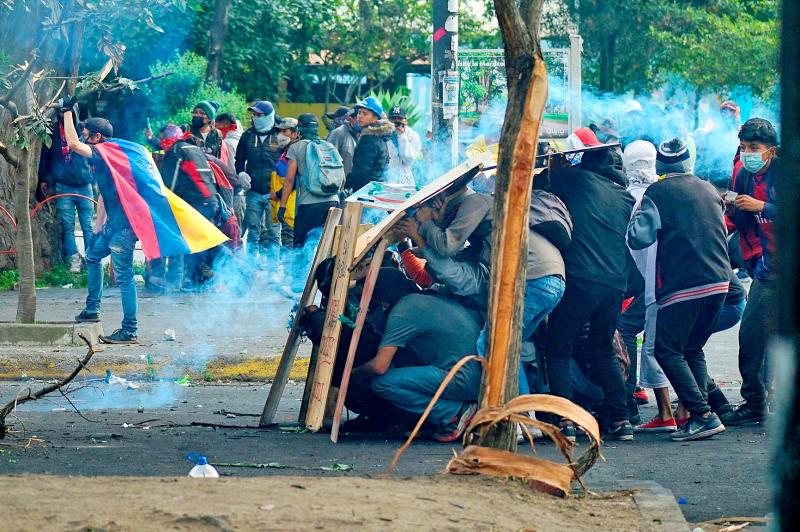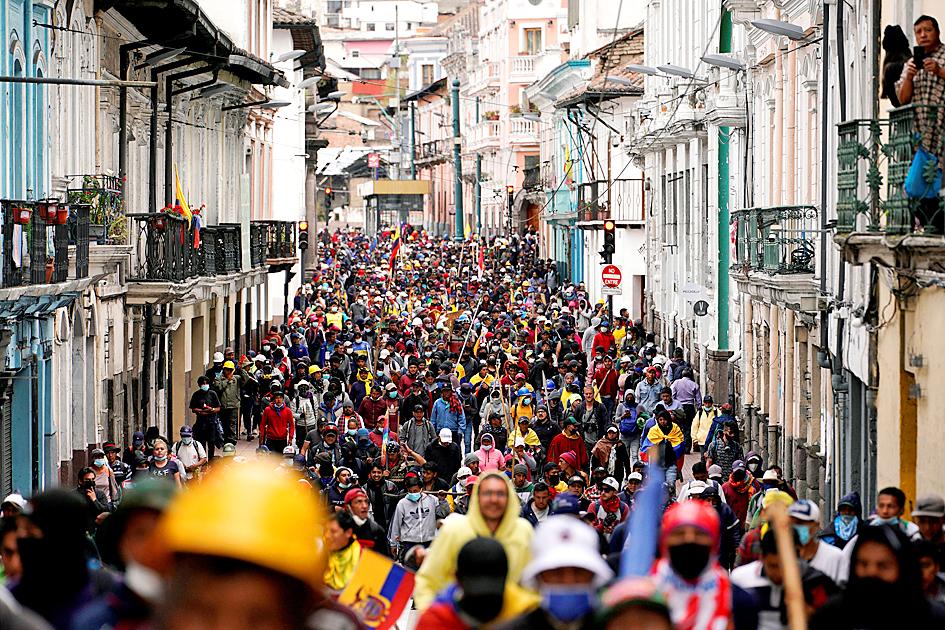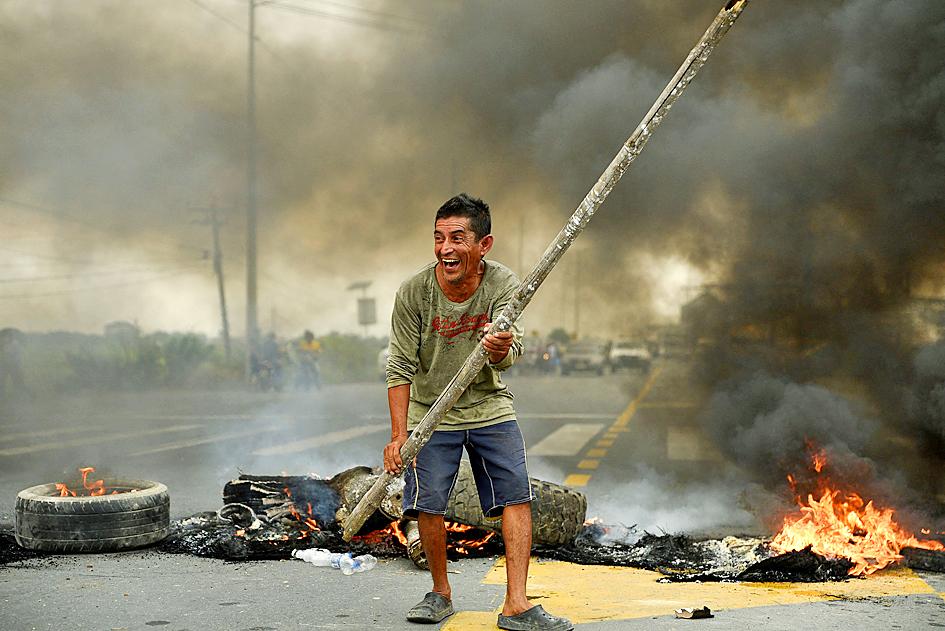Thousands of people on Wednesday flooded the Ecuadoran capital, Quito, for a 10th day of demonstrations over living costs.
The government rejected protesters’ demands to lift a state of emergency in six of the country’s 24 provinces and said that 18 officers were missing following an attack by protesters on a police station in the Amazonian city of Puyo.
The capital has been semi-paralyzed since Monday, with the arrival of about 10,000 protesters from across the country who have been taking to the streets daily with demands for fuel price cuts and other social aid amid growing economic hardship.

Photo: AFP
Protesters burned tires and branches, while barbed wire and military guards protected the presidential headquarters.
About 90 civilians and 100 security personnel have been injured, according to rights groups and the government, and about 87 civilians arrested since the countrywide protests started on Monday last week.
In a bid to end the violence, Ecuadoran President Guillermo Lasso has proposed dialogue with the Confederation of Indigenous Nationalities of Ecuador (CONAIE), which called the protests.

Photo: Reuters
However, CONAIE leader Leonidas Iza has said that talks were conditional on the state of emergency being repealed and the “demilitarization” of a park in Quito that has been a rallying point for indigenous people, but was taken over by security forces.
“We cannot lift the state of exception because that would leave the capital defenseless, and we already know what happened in October 2019 and we will not allow that,” Ecuadoran Minister of Government Francisco Jimenez told the Teleamazonas channel.
CONAIE led two weeks of protests in 2019 in which 11 people died and more than 1,000 were injured.

Photo: Reuters
Iza on Wednesday said that the government has “blood on its hands” for its response to the latest protests.
Ecuadoran Minister of the Interior Patricio Carrillo said that 18 officers were missing after an attack that injured six others, as well as a protester.
“The mob began setting fires with police still inside patrol cars, began looting, burning ... until they ended up torching the police facilities in the center of the city,” Carrillo said.
Olmedo Ayala, 42, said that indigenous people were “very annoyed with the government.”
“We live in economic crisis in the countryside, there is no development there, we have no sources of work, we’re just farmers and our women [live off] milking” livestock, Ayala said.
A key demand of the protesters is a lowering of fuel prices, which have risen sharply in the past few months.
Ecuador exports crude oil, but imports a lot of the fuel it uses.
An indigenous protester died after he was “hit in the face, apparently with a tear gas bomb” on Tuesday following a confrontation with security forces in Puyo, a lawyer for the Alliance of Human Rights Organizations told reporters.
The police said “it was presumed that the person died as a result of handling an explosive device.”
Another protester died on Monday after falling into a ravine outside Quito, with police claiming that incident was also an accident.
However, the public prosecutors’ office has opened a murder investigation.

‘SHORTSIGHTED’: Using aid as leverage is punitive, would not be regarded well among Pacific Island nations and would further open the door for China, an academic said New Zealand has suspended millions of dollars in budget funding to the Cook Islands, it said yesterday, as the relationship between the two constitutionally linked countries continues to deteriorate amid the island group’s deepening ties with China. A spokesperson for New Zealand Minister of Foreign Affairs Winston Peters said in a statement that New Zealand early this month decided to suspend payment of NZ$18.2 million (US$11 million) in core sector support funding for this year and next year as it “relies on a high trust bilateral relationship.” New Zealand and Australia have become increasingly cautious about China’s growing presence in the Pacific

The team behind the long-awaited Vera Rubin Observatory in Chile yesterday published their first images, revealing breathtaking views of star-forming regions as well as distant galaxies. More than two decades in the making, the giant US-funded telescope sits perched at the summit of Cerro Pachon in central Chile, where dark skies and dry air provide ideal conditions for observing the cosmos. One of the debut images is a composite of 678 exposures taken over just seven hours, capturing the Trifid Nebula and the Lagoon Nebula — both several thousand light-years from Earth — glowing in vivid pinks against orange-red backdrops. The new image

ESPIONAGE: The British government’s decision on the proposed embassy hinges on the security of underground data cables, a former diplomat has said A US intervention over China’s proposed new embassy in London has thrown a potential resolution “up in the air,” campaigners have said, amid concerns over the site’s proximity to a sensitive hub of critical communication cables. The furor over a new “super-embassy” on the edge of London’s financial district was reignited last week when the White House said it was “deeply concerned” over potential Chinese access to “the sensitive communications of one of our closest allies.” The Dutch parliament has also raised concerns about Beijing’s ideal location of Royal Mint Court, on the edge of the City of London, which has so

Canada and the EU on Monday signed a defense and security pact as the transatlantic partners seek to better confront Russia, with worries over Washington’s reliability under US President Donald Trump. The deal was announced after a summit in Brussels between Canadian Prime Minister Mark Carney and European Commission President Ursula von der Leyen and European Council President Antonio Costa. “While NATO remains the cornerstone of our collective defense, this partnership will allow us to strengthen our preparedness ... to invest more and to invest smarter,” Costa told a news conference. “It opens new opportunities for companies on both sides of the